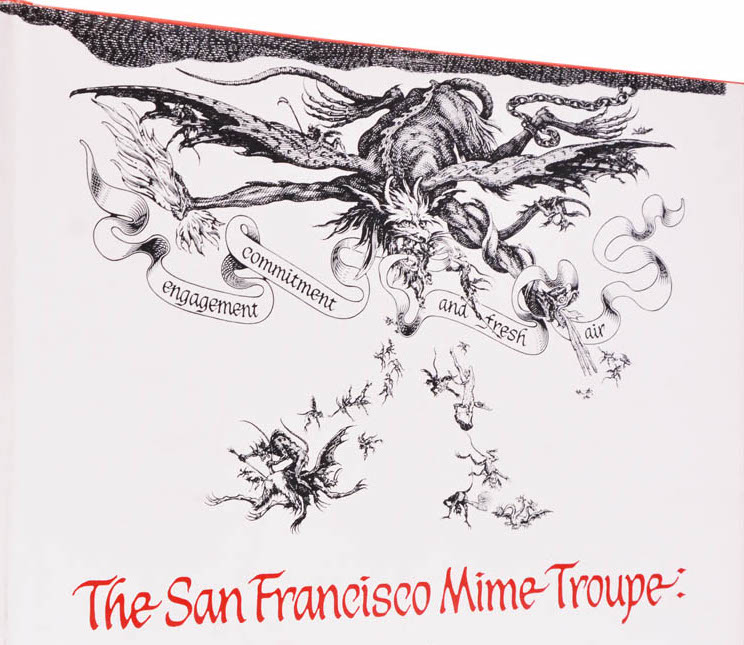
That Saturday, I found the park where the San Francisco Mime Troupe had set up under a gray sky, torn ragged blue as the morning sun burned off the fog. The sun warmed the grass. People wandered into the park to lounge on blankets, to sit cross-legged, tipping up green gallon jugs of Zinfandel and Chablis. Nobody brought Gallo. The grape strike was on, and the farm workers would win.
I wanted to join that company.
The Mime Troupe stage consisted of wooden platforms and a painted canvas curtain with bright ribbons floating in the breeze off the wood-framed uprights. Across the top, stretched between the uprights, a hand-painted sign in cartoon gothic announced the San Francisco Mime Troupe. Above the company sign, a medieval griffin held a banner in its beak promising “engagement, commitment, and fresh air.” The stage, the painted curtain and its flags formed a focal point on the green grass in front of the wedding-cake arches, cornices, and towers of a large gothic cathedral, named after Peter and Paul.
Off to one side, a circle of performers beat tambourines and a primitive drum. One of them played a recorder. They sang a song in Italian and danced, dressed in ragged street versions of Shakespearean garb. This scenario played out years before the tidal wave of ye olde renaissance faires engulfed our parks; I’d never seen anything like it.
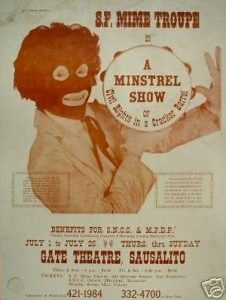 My eye fell first on a tall, gangly actor with straight, long hair, dressed in red-dyed long johns. A second, stocky actor dressed in tights and billowing pantaloons and a ridiculous silk blouse held a mask while he sang. A dark-skinned woman, older but beautiful, ageless to my young eyes, dressed in a peasant skirt and scoop-neck blouse, danced and beat a tambourine. Her eyes were gigantic, and she sang the way she danced — strong and fluid.
My eye fell first on a tall, gangly actor with straight, long hair, dressed in red-dyed long johns. A second, stocky actor dressed in tights and billowing pantaloons and a ridiculous silk blouse held a mask while he sang. A dark-skinned woman, older but beautiful, ageless to my young eyes, dressed in a peasant skirt and scoop-neck blouse, danced and beat a tambourine. Her eyes were gigantic, and she sang the way she danced — strong and fluid.
This ragged Troupe pranced onto the stage, singing, the crowd clapping out the tempo. The stage floor became a giant drum, actors’ feet pounding out the beat. They disappeared behind the curtain and the show began. First came a military general dressed in black with a stubby sword. He moved in gallops, like a child pretending to ride a horse. He introduced the play in a phony Spanish accent.
The beautiful servant girl joined him onstage where they performed a hip, updated vaudeville routine full of gags about local politicians, drugs, and the Vietnam War. I got it. They had brought the 16th century into the present, and they were playing in the marketplace to the peasants. They were crude and funny and very tight, each character taking on specific postures and movements. They spoke in purposely broad Spanish and Italian accents, caricatures of all classes.
Another actor played a fop and a phony philosopher, a doctor, and an imaginary invalid all in one, like in a Molière play. A second woman played the ingénue, and a harlequin clown played a lovestruck servant. Two uniformed characters played grunts in the occupying army, the Italian military. I sat on the grass, leaned back on my elbow, and laughed.
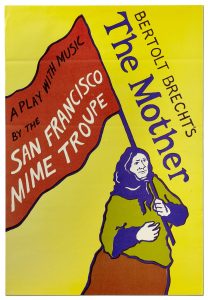 Everybody wanted to get rich. Of course, they were forced into the narrow confines of their lowly serf and merchant classes so they could only steal from each other. The olive-skinned servant girl was the most powerful in the cast, the only character searching for the truth.
Everybody wanted to get rich. Of course, they were forced into the narrow confines of their lowly serf and merchant classes so they could only steal from each other. The olive-skinned servant girl was the most powerful in the cast, the only character searching for the truth.
The beautiful servant girl won out in the end, getting the last word. She carried the moral — You never get rich by ripping each other off, loving and taking care of your brothers and sisters bestowed the only real wealth, love for even the pitiful buffoon who played the cook. Love them all. “And if you want something done…” She bowed deep, her scoop neck revealing her fine figure. “Do it yourself.” She stood up, flashing a knowing “gotcha” wink and a white, white smile, while the rest of the Troupe danced back onstage for a raucous curtain call.
The audience rose, cheering, whistling, applauding. The whole company leapt offstage and moved among the crowd, shouting, “We don’t take no foundation grants, Bank of America hates us. We give to you, you give to us, brothers and sisters. Give us your money, moolah, smackers, simoleons, shekels, bones, clams, guilt gelt.”
I had been a political animal since childhood, rocketed by my parents left-wing take on history, the world, and the long arm of McCarthyism. But my theater experience had been limited to fairy-tale operettas, a few high-school shots at Gilbert & Sullivan and Oscar Wilde, without any mention of his gender proclivities. College carried me over to the naturalists like Shaw or Ibsen and Chekhov, revolutionary in their day but far removed from the growing tensions of mid-’60s America.
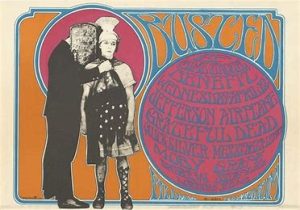 But on that hot Saturday in San Francisco, I watched this ragtag theater company with real acting chops mix bawdy comedy with astute political analysis on a stage that stole from the marketplace theater of 16th-century commedia, purloined the Marxist expressionism of Weimar Germany’s Bertolt Brecht and Kurt Weill, and spat it out into the gathering storm of the Vietnam War, racism, and the romance of the Beats.
But on that hot Saturday in San Francisco, I watched this ragtag theater company with real acting chops mix bawdy comedy with astute political analysis on a stage that stole from the marketplace theater of 16th-century commedia, purloined the Marxist expressionism of Weimar Germany’s Bertolt Brecht and Kurt Weill, and spat it out into the gathering storm of the Vietnam War, racism, and the romance of the Beats.
My mind was blown. For real. The Mime Troupe had, in one afternoon, synthesized my theater animal and my political beast. I shifted into dream gear. What a weapon to wield in civil conflict, to foment cultural crises, to preach laughter and the truth to the clashing communities of wartime America. I was ecstatic! If they would take me, I could make the theater my political work and my political work the theater. I wanted to join that company.
# # #
* Excerpted from Rocked in Time, Vol III of my Resistance Trilogy, but close enough to the truth. — cd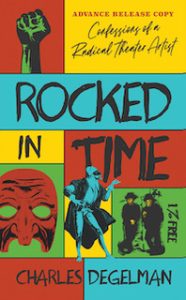
Writer, editor, and educator based in Los Angeles. He's also played a lot of music. Degelman teaches writing at California State University, Los Angeles.
Degelman lives in the hills of Hollywood with his companion on the road of life, four cats, assorted dogs, and a coterie of communard brothers and sisters.



Bravo Chas, and lucky me – I’ve read the whole sprawling, bawdy, wordy, wonderful book!
Thanks for reading my Rocked in Time tome, Dana! Watching the Mime Troupe was indeed, impactful!
Thanks for including this section from your book—it certainly brought back the Mime Troupe performances I saw and the energetic, funny, irreverent and challenging feeling of the show. Entertainment and politics entwined. Not surprising you were drawn to it. I recognize the poster for “The Mother”.
Those were powerful years for the SF Mime Troupe, and I was fortunate to be swept up in its momentum. Thanks, Khati!
Beautifully written, we get the whole mise en scène, from the warm summer SF day, to the constructed proscenium and the characters from commedia dell’arte and other older forms of mass entertainment, but preaching a modern (yet, sadly, age-old) message. They were vibrant and hip and of course you were caught up immediately. Those of us who have followed your writing for years know what happened next, but this was definitely impactful art for you, Charlie. Thank you for sharing this wonderful story.
Thanks, Betsy! It was, as you say, an impactful moment and, without being dramatic (haw haw) it set the course of my life.
Charlie, I loved your story on the San Francisco Mime Troupe and what it reminded you, happily, about what can be done by passionate and talented performers who may have not gotten the widespread recognition they deserve. You expressed it beautifully in the passage: “But on that hot Saturday in San Francisco, I watched this ragtag theater company with real acting chops mix bawdy comedy with astute political analysis on a stage that stole from the marketplace theater.” Nicely presented!
Thanks, Jim. You certainly caught the heart of it with that pull quote!
“The kingdoms of experience, in a precious winds they rot, While paupers change possessions. Each one wishing for what the other has got
And the princess and the prince discuss what’s real and what is not
It doesn’t matter inside the Gates of Eden”
C, your writing is so descriptive, the words so perfectly penned, I feel as if I was there, laying on that green grass with a bottle of wine. If I wrote stories instead of poems, you would be the writer I would emulate. So vivid, can’t believe it’s non fiction. I’m not there yet ’Gates Of Eden’. I savor your storytelling, I meet you in my favorite room at the end of the day, sometimes with a summer cocktail and let your powerful and historical work of art inform me like no other. Art’s Impact. Thank you
Thank you so much, Patty. I’m delighted to hear that you’re plowing through Gates of Eden. It pretty much covers the waterfront, although each of the other volumes cover different elements of the resistance. Just love that you’re diggin’ it! Maybe we can talk when you are so moved.
Speaking of moved, you bring me to tears with your poetry, this newest piece so finely layered and so full of ahem, impactful verse! Mutually admiring… charlie
This is great! I knew it was bout the Mime Troupe well before you got there, as it immediately called back the feelings I had of seeing similar actors in similarly outdated garb in Harvard Yard, babbling about General Hersheybar and General Wastemoreland! They were the best–even better, obviously, after they assimilated your own contributions.
Thanks, dale. I’m not sure of your Cambridge vintage, but I graduated in ’67 and returned with the Troupe that fall to perform L’Amant Militaire, an anti-Viet war commedia in Sanders Theater. It was very satisfying to return so quickly to Harvard with such a powerful play. General Hersheybar and General Wastemoreland were fixtures around the Bay Area at all sorts of public events, from Grateful Dead concerts to free food in the park, to the Mime Troupe set up as described in the excerpt I stole from my own novel. Thanks again. Venceremos, baby!
Reading this made me think of life as huge maze, full of decisions; left? right? Straight on? But each decision closes off the other paths, and you march onward to the next bi or trifurcation, and more decisions that prove irrevocable. Sometimes, more frequently as you realize that so much more of the maze lies behind than lies ahead, you think…was this path inevitable?
Yes, an accurate response to the horror of limitless possibilities, Dave. I particularly liked your final confession, that “more of the maze lies behind than lies ahead…” These days, I like that! I’ve lived many lives, some of them sucked, some of them were a mix of amazing, magical, productive, powerful, failed fiascos, broken hearts, but through it all… haw haw…
I DID IT MYYYYYYYYYY WAYYYYYYYY!!!